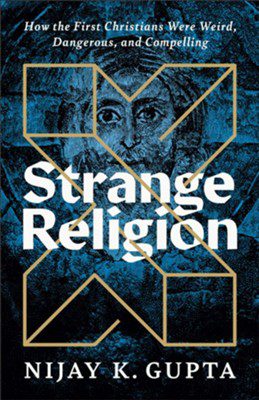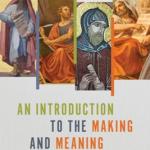Nijay Gupta has written a new book. It’s called Strange Religion: How the First Christians Were Weird, Dangerous, and Compelling.
I liked the book so much I reached out to Nijay to interview him about it.
Enjoy!
Writing a book is a difficult task. What specific change were you intending to make among Christians (and perhaps non-Christians) by writing this book?
This is an ad fontes (“back to the origins”) kind of book—inspiring Christians today by going back to the foundations of the Christian faith in the culturally distinct and deviant ideas, practices, and lifestyle of our spiritual ancestors. I want Christians today to ask: would our Christian ancestors recognize us as their true descendants?
Most readers want to know the answer to this question when they consider buying a book – what’s in it for me? Why do I want to spend the money and time on buying your book? What am I going to get out of it? What is your answer to this question?
We tend to read the Bible in a “timeless” sense, like reading a fortune cookie message. But the apostolic writings were written a certain time and place and culture, and I argue that really understanding Roman religion (the state religion of the time) helps to draw out the distinctiveness of Jesus and his people. I talk about my book as 1/3 Christian origins, 1/3 New Testament theology, and 1/3 “weird history”!
Share 3 “aha” moments that struck you the most when you were doing research for your book.
- Rome was polytheistic and allowed many gods, even foreign gods, but for a non-Roman god to be “accepted” in the Roman pantheon, they had to be Romanized, conformed to Roman hierarchy and power. Christians refused to conform in that way, and that is one reason they were called atheoi – “the godless.”
- Romans believed to truly worship a god, it was best to be a special place (a temple), with a special person (a priest), bringing a special item (a sacrifice). Christians believed, because of Christ and the Spirit, you could worship God fully anywhere, without human mediators, and you don’t need special equipment—how weird!
- Roman society was designed according to a great pyramid of power, with the Olympians at the top, then other deities, then the emperor, the elites, and then far down below are commoners, slaves, criminals, and immigrants. In society you tried to move up that pyramid (most tried and failed), but in the Incarnation, Jesus Christ willingly moved down. Who would do that?
For those who don’t read too many books, give us a two or three paragraph summary of the key points you make in the book.
Roman religion was focused on keeping peace with the gods (like Jupiter/Zeus), and promoting favor from them. The Olympians were seen as celestial overlords to appease and please. This was not a personal religion or a “religion of the heart.” This was politics and power, survival and conquest.
When Jesus and his followers came along, they turned all of this upside down. They preached that God is not a demanding overlord, he is more like a loving parent. And you don’t need rituals of appeasement, because God is gracious, and because of the self-giving work of the Son, God is favorable even towards sinners and those who made themselves enemies of God.
The early Jesus followers believed that Christianity is not just another religious option on a menu. Jesus ushered in the true “Kingdom of God,” which reflects a good and righteous King, and the culture and way of the King. The early Christians didn’t directly oppose Caesar or Jupiter, but the way they talked, thought, worshipped, and lived made it clear this Kingdom of God was meant to threaten any and all other kingdoms of the world, not with weapons of war, but the power of love, justice, and the Spirit.
Today’s Christianity is so diverse and very different from what it was in the first century. Therefore, in what ways are Christians strange and dangerous in our time?
When I use the language of “strange” in my book, I am especially talking about cultural deviance. And when we are at our best today, we are getting into all kinds of “good trouble,” not to stand out for the sake of standing out, but because we are marching to the beat of Jesus’ drumbeat alone, and following him like the pied piper, regardless of what the wider culture is doing.
One example: joy. Christians are given tools to experience the range of human emotions (anger, grief, fear), but the place we live is “joy,” because of the gospel. In an often dark, cruel, and hopeless world, we live in joy, we have a spiritual anchor that grounds us, and we can share that joy with others.
On pg. 56, you say the term “Christian” emerged between A.D. 80-90. But wasn’t that term used decades before in Acts 11 and 1 Peter?
The dating of 1 Peter is complex, and yes Acts makes reference a few times to “Christians.” The odd thing is no other NT writer uses this language, Paul doesn’t. You’d think if it was common parlance, it would appear in Paul. The term Christianos in Greek means “Christ-supporter” or “Christ-devotee.” Many scholars think it was perhaps how non-Christians started to refer to these Christ people, but it probably didn’t catch on amongst Christians until the end of the first century. The second century Christian text Epistle to Diognetus uses the term frequently.
The early Christians were derogatorily called atheists, cannibals, and subversives (to the Empire). What, in your view and observation, are they called today?
Hypocrites, and people who are arrogant, close-minded, intolerant, anti-science. If I could wave a magic wand and make something true of Christians in the eyes of wider America (where I live), I would want people to say, “Those Christians are compassionate.” I think that would do make Jesus proud!
In today’s culture, Jesus is no longer seen as a criminal as He was in the first century. Why do you think that is?
In popular culture, Jesus is known as a teacher of good morals, like things in the Sermon on the Mount. He taught love and mercy. But people don’t really understand for him to be crucified, he had to have been considered a threat to the political order. We have often detached Jesus’s words from his context.
What do you say to the skeptic who says that Jesus is the imaginary friend that Christians believe, but there’s no evidence He is still alive today.
Well, historically there is no reason to doubt Jesus was a historical figure, and I suggest an intelligent skeptic read N.T. Wright’s Jesus and the Victory of God and his Resurrection of the Son of God. But generally, I would say, “faith” means I can’t see Jesus with my physical eyes and his presence is experienced spiritually and existentially; if the person needs a brick-and-mortar Jesus, that’s not going to happen (right now). But to say God doesn’t exist or isn’t important because my sense can’t confirm him, well that’s an odd way for a creature to react to God. I’m with C.S. Lewis on this: either you know your need for God or you don’t; either you are sick and need a Great Physician, or you think you’re “fine.” Well, I say, call me when you are sick, we’ll talk!
In the book, you talk about the day of Christ as a time where God will sent all things right. Do you believe the day of Christ is the same as the Day of the Lord mentioned in both OT and NT? Make a list of some of things that will happen on the day of Christ?
Yes, I would put these things together: that Great Big Day (Day of the Lord, Day of Christ) is a mixture of several things at once (and it might not all happen in a 24-hour day): exposing everything in the dark to light, vindication for some, condemnation for others, and the renewal and consummation of God’s plan for the world.
Based on the feedback so far, what are readers saying about the book?
I think it’s accomplishing what I hoped for—inspiration, clarity of understanding of what the early Christians thought and did in context. Some critics feel like I overgeneralized or lack nuance. Fair enough, it’s a book for pastors, students, and laypeople. Some have said they wanted it to get into practicals for today. I had originally intended to do that, but I wrote it first as a history of earliest Christianity in religious context, and then I sat back and thought: “It’s done.” I wanted to enchant the disenchanted by dropping them into ancient Christianity. To then give a set of practices for today felt counter-productive. I highly recommend that when folks read my book and want advice, they should check out John Mark Comer’s book Practicing the Way of Jesus.
What else would you like readers to know about your book?
It’s got pictures!














